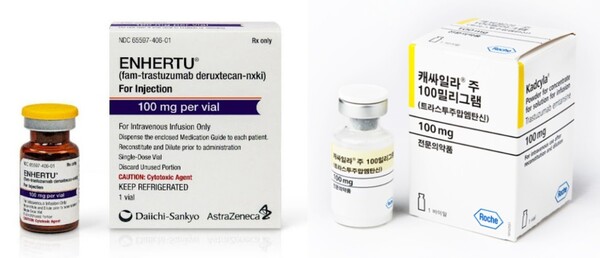
The socioeconomic benefits of prolonged progression-free survival (PFS) by using Enhertu (ingredient: trastuzumab deruxtecan) in the second-line treatment of HER2-positive metastatic breast cancer patients in Korea amount to approximately 260 billion won ($196.3 million), a study showed.
In Korea, Enhertu passed the Cancer Disease Review Committee, the first gateway to receive health insurance benefit review, in May.
The drug is under review at the Economic Evaluation Subcommittee and industry watchers are paying attention to whether this study would help speed up the review of Enhertu reimbursement.
Researchers from Sungkyunkwan University and Samsung Medical Center published the paper, "The Societal/Economical Impact of Trastuzumab-deruxtecan in Patients with Human Epidermal Growth Factor Receptor2-positive Metastatic Breast Cancer," on Aug. 31 in the Journal of Pharmacology.
In the paper, the researchers said the incidence of breast cancer in Korean women is high and the onset starts in their 40s, which translates into a significant loss of national productivity.
According to a preliminary study conducted in Korea, the loss of domestic GDP due to breast cancer was 642 billion won as of 2014, which is about six times higher than the 92 billion won estimated in 1999.
This social burden is expected to grow in the future given the increasing incidence of breast cancer in Korea.
HER2-positive breast cancer accounts for about 20 percent of all breast cancers.
Recently, Enhertu emerged as a new treatment for metastatic breast cancer patients, demonstrating significant clinical improvement over existing therapies.
"Given that breast cancer occurs during a period of high economic activity in Korea, improvements in clinical parameters such as PFS and overall survival may not only improve survival but also reduce socioeconomic losses," the study said.
The study aimed to calculate the socioeconomic benefits of using Enhertu in the second-line treatment of HER2-positive metastatic breast cancer patients.
The researchers first identified patients prescribed currently reimbursed Kadcyla (trastuzumab emtansine) at the same treatment level (second-line) as Enhertu.
To calculate the clinical and socioeconomic benefits of Enhertu, the researchers utilized results from the DESTINIY-Breast03 trial, which directly compared Enhertu to Kadcyla.
The clinical benefit was assessed by calculating the prolonged PFS with Enhertu compared to Kadcyla; however, because a metric directly related to disease progression is not available in health insurance claims data, "time-to-discontinuation" was used as a surrogate metric and compared with PFS reported in previous randomized clinical trials and published reports based on patient case records.
Of the 374,725 patients diagnosed with breast cancer in health insurance claims data from January 2007 through May 2021, 2,212 patients received Kadcyla. Patients aged 40-49 years were the most common age group with 836 patients (37.8 percent), followed by 623 patients (28.2 percent) aged 50-59 years, 422 patients (19.1 percent) aged 30-39 years, and 65 years and older.
Using health insurance claims data from the DESTINY-Breast03 trial to estimate median PFS (mPFS) by age group with either Kadcyla or Enhertu, the researchers found that Kadcyla was associated with a minimum of 7.1 months (≥65 years) and a maximum of 12.5 months (in their 30s) in mPFS, while Enhertu was associated with a minimum of 23.4 months (≥65 years) and a maximum of 41.1 months (in their 30s) in mPFS, a more than threefold increase in all age groups.
The researchers then converted the extended PFS calculated for each age group into paid and unpaid work hours to estimate the socioeconomic benefits of using Enhertu.
The resulting socioeconomic benefit of the additional years of PFS with Enhertu compared to Kadcyla was estimated to be 261.4 billion won, or an average of 118 million won per patient. Based on various sensitivity analyses of the estimates, the socioeconomic benefits of Enhertu range from around 62 million won to 110 million won per person.
"Unlike in the West, breast cancer patients in Korea are diagnosed at a younger age, and more than 84 percent of patients are diagnosed under the age of 65, which is the age of the working population, so the individual burden of breast cancer and the socioeconomic burden on them is significant," said the study.
"Under these circumstances, the introduction of a treatment that significantly prolongs PFS and survival is likely to not only improve the quality of life of patients but also reduce the national financial and socioeconomic burden."
Enhertu is currently recommended for the second-line treatment of HER2-positive metastatic breast cancer in the U.S. and European guidelines, and its effectiveness and safety have been confirmed, the researchers said.
"It is also worth noting the socioeconomic value that the use of a new drug with proven clinical efficacy can contribute, as it was recently approved in Korea."
Related articles
- Enhertu recognized in Asia, too, as essential targeted agent for breast cancer
- Daiichi Sankyo's Enhertu passes cancer drug benefit review after patients’ petition
- Enhertu cements its position as standard 2nd treatment for HER2+ breast cancer
- ‘Korea must raise cancer patients’ burdens to expand their treatment access’

